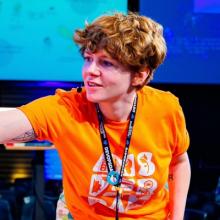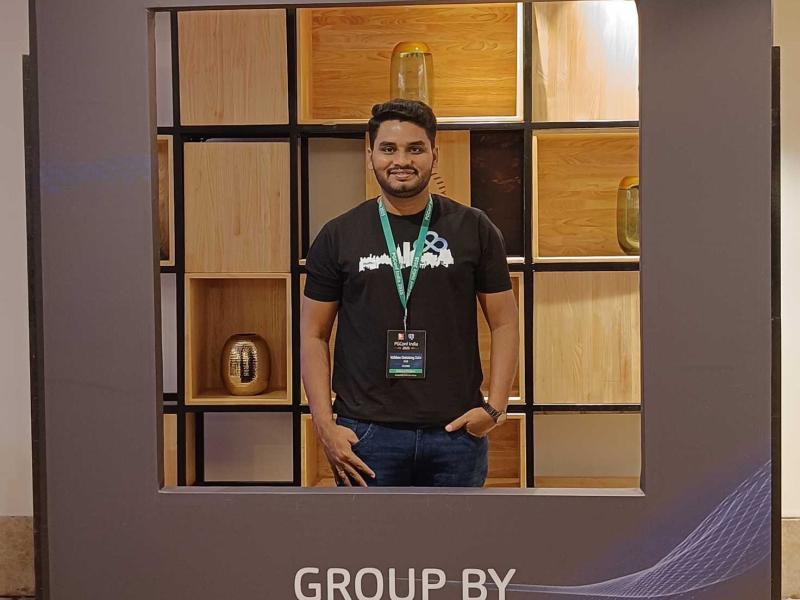Earlier this year we started a program (“Developer U”) to help colleagues who show promise for PostgreSQL Development to become contributors. Because I’m a softie for people’s origin stories, I talked to several of the participants about their motivations, hopes, dreams, and patches.
Vaibhav Dalvi is a Staff SDE. Prior to joining EDB in November 2018 he had no professional experience with databases. Outside of work, Vaibhav is passionate about sports and history. He enjoys playing cricket and treks to the Western Ghats to visit the historic forts built by Maratha leader, Chhatrapati Shivaji Maharaj.
Vaibhav Dalvi at PGConf India, in Bengaluru, 2025.
A bit of background
Vaibhav has a Bachelor's degree in Electronics and Telecommunication Engineering. He completed a postgraduate diploma in Embedded Systems. His education has been focused around foundational computer science principles, the C/C++ programming languages, and data structures.
While his work has been extending our core product as a member of the DBServer team, he had not yet had the chance to actively work on community PostgreSQL features. Until now of course. "I am very keen to get involved, contribute to the community, and expand my expertise beyond EDB's proprietary features!"
Vaibhav was already active in the PostgreSQL community through public speaking and participation in local events like PGDay Pune and PGDay Mumbai. He presented at PGConf India, in 2020, and 2023.
Contributing to PostgreSQL
What excites Vaibhav most about PostgreSQL is its extensibility and architectural robustness. “The idea of contributing a patch, fixing a bug, or having a feature I developed reviewed and merged into the core project—where it will benefit thousands of organizations globally—is a major career goal for me!”
He’s actively working on his first upstream contribution to the PostgreSQL community (mailinglist thread, commitfest entry). "I am currently working on a specific feature that has been fully developed and reviewed . The proposal for this feature has already been discussed within the community mailing lists, and we are now in the final stages, pending the ultimate commit."
"This experience, even before the final merge, has been invaluable. It has provided me with firsthand knowledge of the rigor required for code quality, documentation standards, and the collaborative process necessary to contribute effectively to a major, high-impact open-source project like PostgreSQL."
Contributing to PostgreSQL was different than Vaibhav expected it to be: "I expected the development and review process to move relatively quickly once a feature was submitted, similar to internal corporate sprints or review cycles. The review isn't just about if the feature works, but how it integrates seamlessly with decades of existing code and conventions. Every detail, from documentation to error codes, is rigorously debated."
Timelines in the project are determined by the community's bandwidth, which is quite different from and require sustained, patient engagement over months. Vaibhav is currently involved in two significant contributions to the PostgreSQL community, actively developing a new server feature and reviewing another major server feature:
pg_get_subscription_ddl()is a new server function designed to retrieve the full Data Definition Language (DDL) statement for a subscription when users provide either the subscription name or its OID. Interested, here’s the Mailing List Discussion, and the Commitfest Entry.- Vaibhav is reviewing another important server feature: non-text mode for
pg_dumpall. Again, links to the Mailing List Discussion, and the Commitfest Entry.
What’s next?
Vaibhav is excited to dive into query planning and optimization next: "I want to understand how community developers approach and optimize the query planner, specifically looking for opportunities to improve cost estimation or execution strategies that I can apply to my current work and future contributions."
And, given the critical nature of these systems, he’s curious to explore the internals of Write-Ahead Logging (WAL) and the logical replication mechanism. "Understanding this architecture is crucial for tackling enterprise-grade challenges we’re seeing at EDBs customers."
To be continued, I’m sure.

